外研版(2019)选择性必修第二册 Unit 4 Breaking boundaries Understanding ideas 教学课件 (共42页PPT含视频)
文档属性
| 名称 | 外研版(2019)选择性必修第二册 Unit 4 Breaking boundaries Understanding ideas 教学课件 (共42页PPT含视频) |
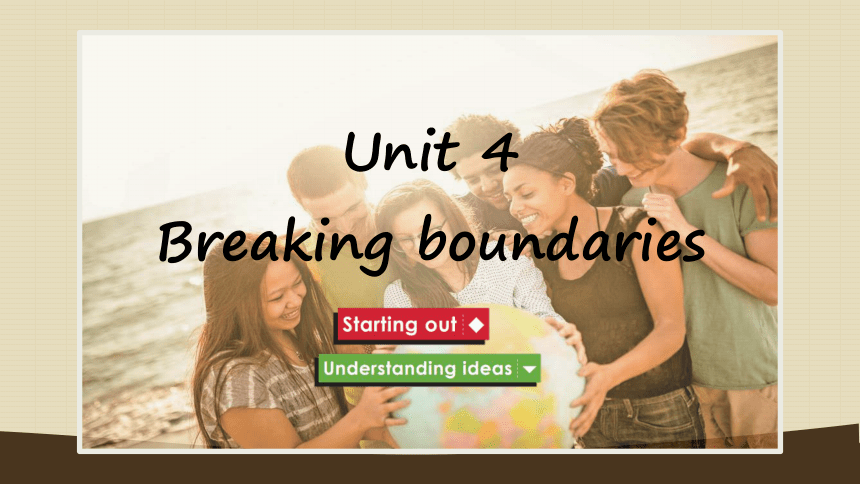
|
|
| 格式 | pptx | ||
| 文件大小 | 32.9MB | ||
| 资源类型 | 教案 | ||
| 版本资源 | 外研版(2019) | ||
| 科目 | 英语 | ||
| 更新时间 | 2024-10-14 15:17:41 | ||
图片预览

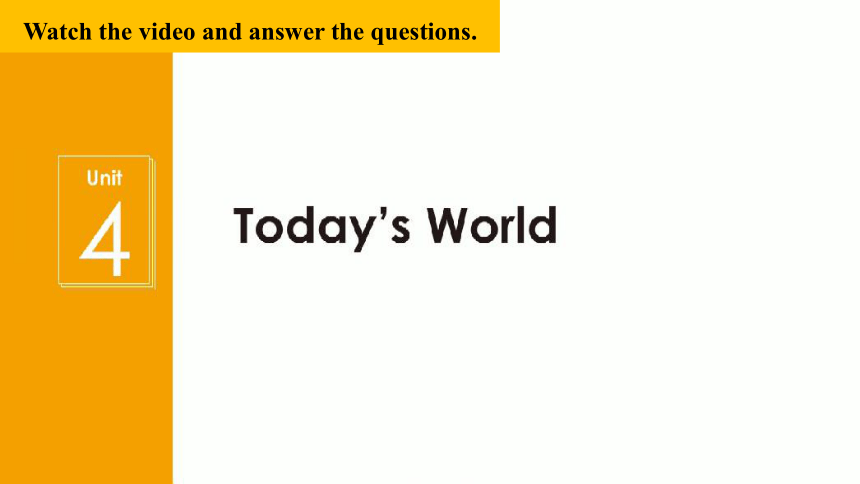
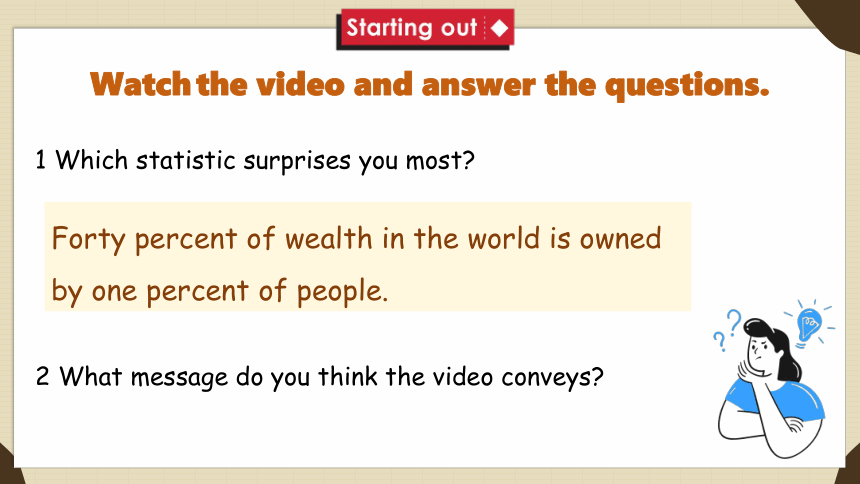
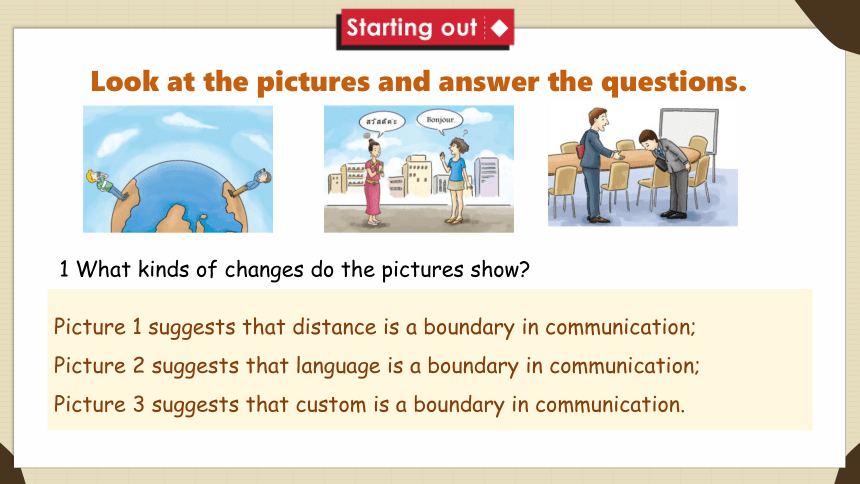
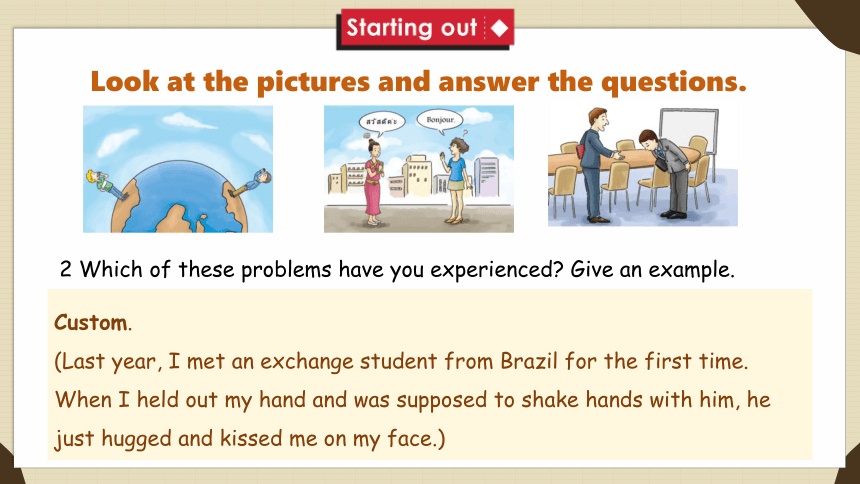
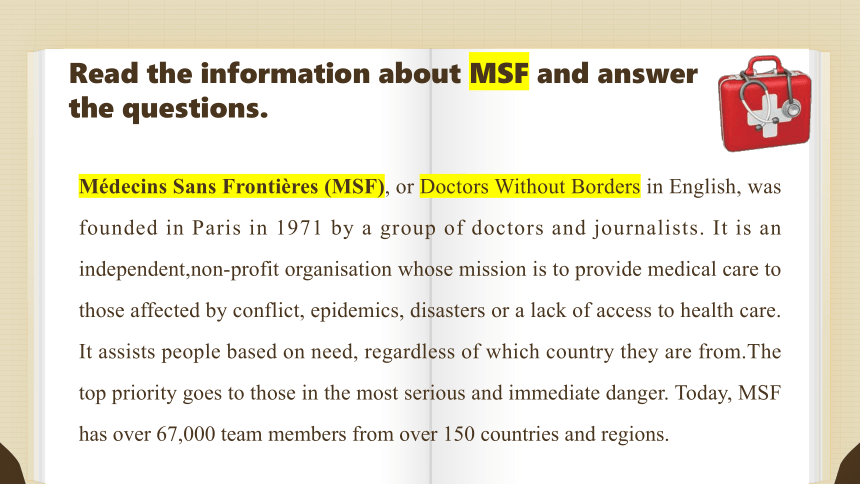
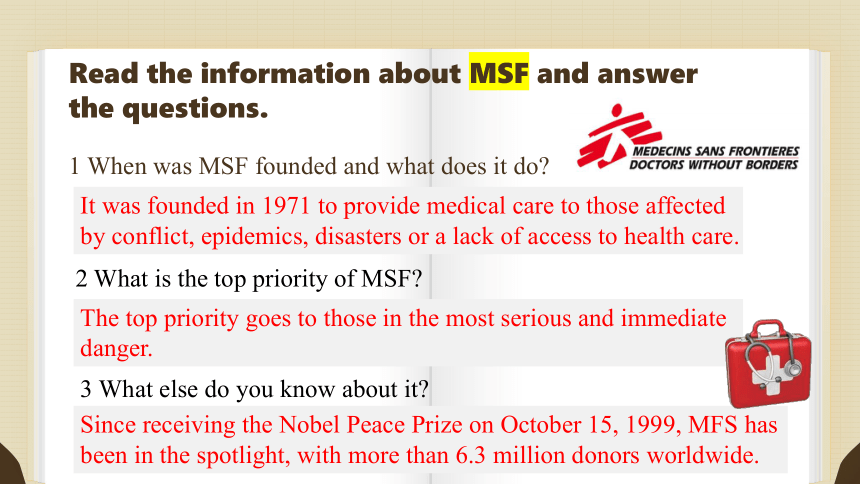
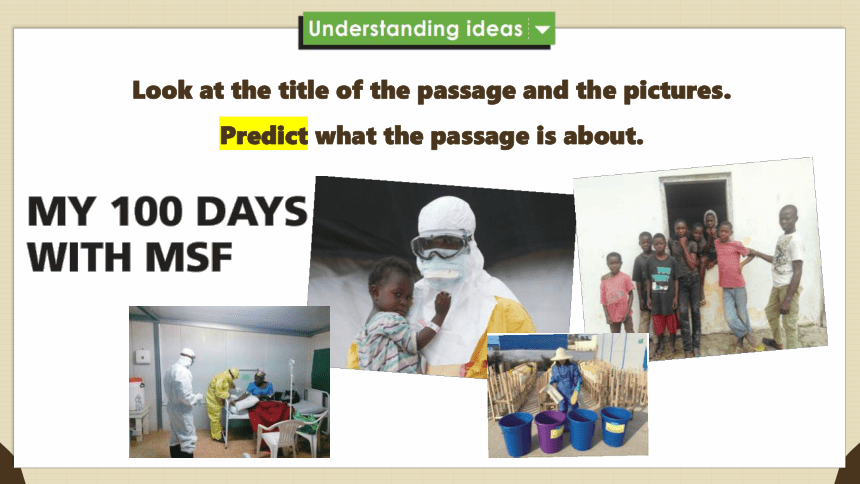
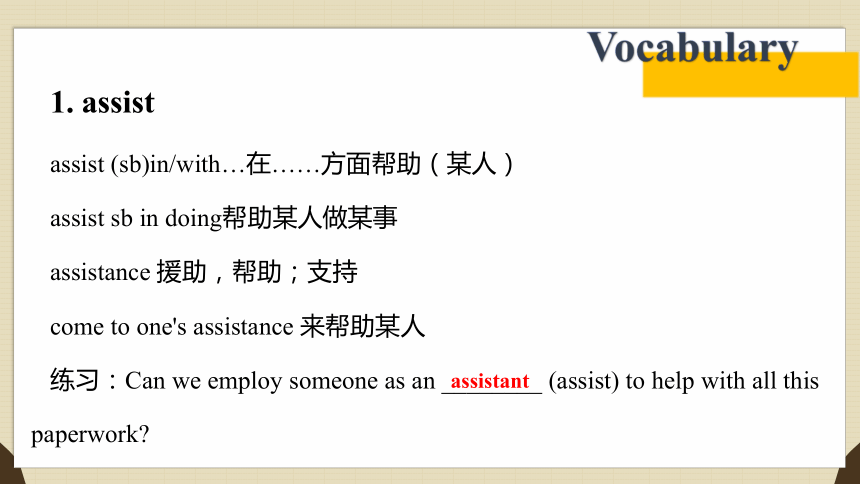

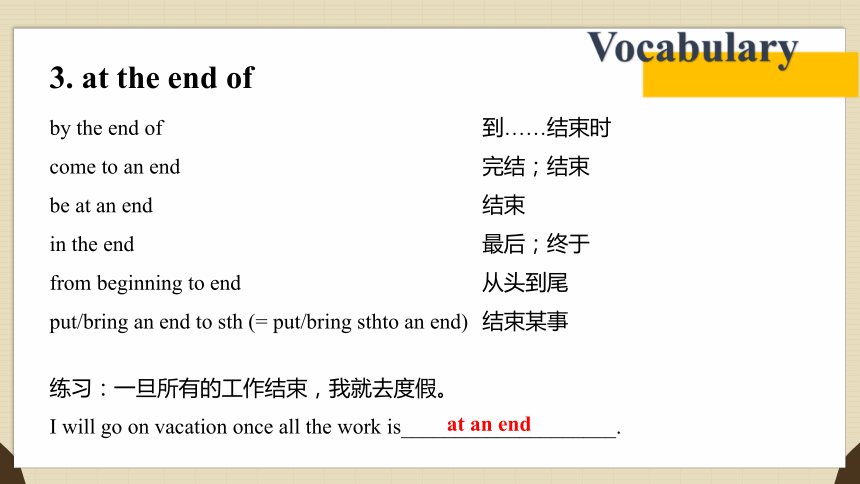
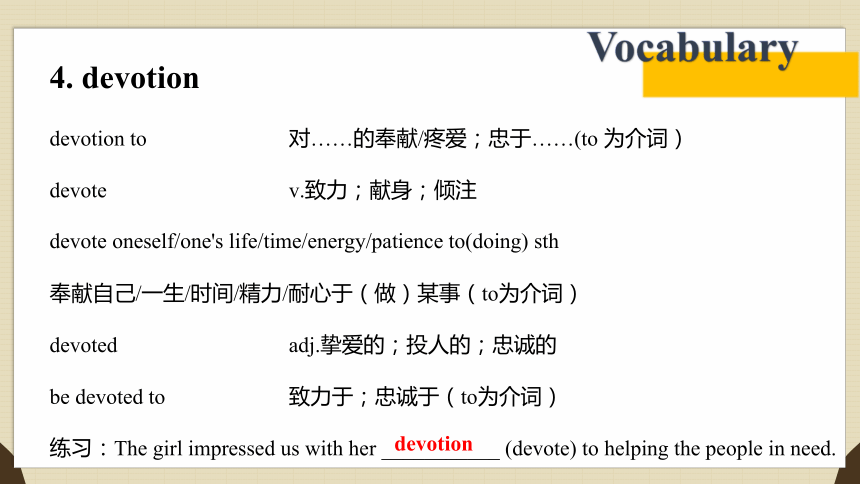
文档简介
(共40张PPT)
Unit 4
Breaking boundaries
Watch the video and answer the questions.
Watch the video and answer the questions.
1 Which statistic surprises you most
2 What message do you think the video conveys
Forty percent of wealth in the world is owned by one percent of people.
Look at the pictures and answer the questions.
1 What kinds of changes do the pictures show
Picture 1 suggests that distance is a boundary in communication;
Picture 2 suggests that language is a boundary in communication;
Picture 3 suggests that custom is a boundary in communication.
Look at the pictures and answer the questions.
2 Which of these problems have you experienced Give an example.
Custom.
(Last year, I met an exchange student from Brazil for the first time. When I held out my hand and was supposed to shake hands with him, he just hugged and kissed me on my face.)
Read the information about MSF and answer the questions.
Médecins Sans Frontières (MSF), or Doctors Without Borders in English, was founded in Paris in 1971 by a group of doctors and journalists. It is an independent,non-profit organisation whose mission is to provide medical care to those affected by conflict, epidemics, disasters or a lack of access to health care. It assists people based on need, regardless of which country they are from.The top priority goes to those in the most serious and immediate danger. Today, MSF has over 67,000 team members from over 150 countries and regions.
Read the information about MSF and answer the questions.
1 When was MSF founded and what does it do
It was founded in 1971 to provide medical care to those affected by conflict, epidemics, disasters or a lack of access to health care.
2 What is the top priority of MSF
The top priority goes to those in the most serious and immediate danger.
3 What else do you know about it
Since receiving the Nobel Peace Prize on October 15, 1999, MFS has been in the spotlight, with more than 6.3 million donors worldwide.
Look at the title of the passage and the pictures.
Predict what the passage is about.
Vocabulary
1. assist
assist (sb)in/with…在……方面帮助(某人)
assist sb in doing帮助某人做某事
assistance 援助,帮助;支持
come to one's assistance 来帮助某人
练习:Can we employ someone as an ________ (assist) to help with all this paperwork
assistant
Vocabulary
2. involve
involve sb in(doing)sth 使某人参与(做)某事
be/get involved in/with 参与;卷人;投入
练习:It is reported that there are many health problems _______ with smoking.
involved
Vocabulary
3. at the end of
by the end of 到……结束时
come to an end 完结;结束
be at an end 结束
in the end 最后;终于
from beginning to end 从头到尾
put/bring an end to sth (= put/bring sthto an end) 结束某事
练习:一旦所有的工作结束,我就去度假。
I will go on vacation once all the work is____________________.
at an end
Vocabulary
4. devotion
devotion to 对……的奉献/疼爱;忠于……(to 为介词)
devote v.致力;献身;倾注
devote oneself/one's life/time/energy/patience to(doing) sth
奉献自己/一生/时间/精力/耐心于(做)某事(to为介词)
devoted adj.挚爱的;投人的;忠诚的
be devoted to 致力于;忠诚于(to为介词)
练习:The girl impressed us with her ___________ (devote) to helping the people in need.
devotion
Vocabulary
5. boundary
boundary changes/disputes 边界变化/争端
national boundaries 国界
练习:The ___________ between Shanxi and Shaanxi is the Huanghe River.
boundary
辨析:
border: 多指国与国之间或两地区的分界处,即分界线附近的边缘部分。
bounds: 常与boundary换用,指土地边界,但意思不如boundary明确,主要用于抽象事物和文学作品中。
boundary: 侧重地图上正式标定的、双方遵守的边界,也可指较小行政单位间的界线。
frontier: 指两国接壤的前沿地区,属于各国的国境和边疆,多指设防的边界。
limit: 含义广泛,常用作复数。指任何界限、范围、分界线外面的部分,可指有形或无形的东西。
Vocabulary
6. relieve
relieve one's feelings 发泄感情
练习:They help _________ people of their life's burdens.
relieve
辨析:
comfort, console, ease, soothe, relieve
comfort: 普通用词,指用语言或行动对痛苦者给予鼓励、勇气和力量,从而减轻其痛苦或悲伤,得到安慰。
console: 较正式用词,侧重缓和或减轻别人的痛苦或悲伤。
ease: 正式用词,指减轻身心的痛苦、不安和忧虑。
soothe: 着重以安慰减轻悲痛、愤怒或激动,使人理智地平静下来。也可指药物等减轻病痛。
relieve: 指解除或缓解某人的病痛、担心或忧虑等,常用被动态。
Now read the passage and check your answer.
The doctor was involved in tackling the infectiousdisease Ebola in Liberia.
Read the passage carefully and choose the best answer.
1.Why did the author arrive in Liberia
A. Because he wanted to learn about Ebola.
B. Because he hadn't been there before.
C. Because he wanted to offer his help.
D. Because he knew Ebola would be beaten.
Read the passage carefully and choose the best answer.
2.Who was Emma according to the third paragraph
A. She would be in charge of the author.
B. Her work would be replaced by the author.
C. She was infected by Ebola and would go home.
D, She was a retired public health official.
Read the passage carefully and choose the best answer.
3.How did the author feel after being introduced
A. Proud. B. Confident
C. Shy. D. Lonely.
Read the passage carefully and choose the best answer.
4.What happened to the family of six
A. The twin girls were saved.
B The parents were alive.
C. All of them died.
D. The brothers were alive.
Read the passage carefully and choose the best answer.
5.How does the author view the crisis
A. The crisis formed a bond between people in different regions.
B. The crisis gave a better understanding of the world.
C. The author hoped that the world would never face such a crisis again.
D. The crisis led him to know many colleagues well.
Choose the ideas conveyed in the passage and find evidence to support your choices.
1 It is not the first time the author has worked with MSF.
2 The work with MSF in Liberia is life-threatening.
3 The author enjoyed working together with all his colleagues.
4 The author always felt frustrated with the high death rate.
Read the passage quickly and find out the main idea of each paragraph.
Para.1:
Para.2:
Para.3:
Para.4:
Para.5:
Para.6:
Para.7:
We celebrate for it is a month since the last reported case.
The writer made up mind to offer help with MSF.
The writer got to know the daily routine and colleagues and started work.
The writer’s daily work was surrounded by blood, vomit and death.
The writer had an unforgettable case.
It is inspiring to work with colleagues from different parts of world and join in a common cause.
We are collaborating to create a global community with a shared future of peace and prosperity.
Organise information from the passage and complete the table.
Time Experiences Feelings
Before arrival How I made up my mind: ___________________________________________________________________________________________________________________
I saw the tragic scenes on the news and I felt it was my duty as a doctor to go there and offer my help.
with strong sense of mission
Time Experiences Feelings
My 100 days How I made up my mind: What my daily work was like: An unforgettable case:
I got to know the daily routine and my colleagues and started my work.
proud,
hopeful,
amazed
Together with the others working for or alongside MSF, I helped those who were infected with the terrible disease Ebola. We worked together, surrounded by blood, vomit and death.
Two young brothers survived the disease after their family members had died.
Organise information from the passage and complete the table.
Time Experiences Feelings
Before arrival What is special about today: What we are doing:
happy,
inspired,
proud,
hopeful
We celebrated because it’s exactly one month since the last reported case, and my time is almost up.
We are collaborating to create a global community with a shared future of peace and prosperity.
Organise information from the passage and complete the table.
We call on the people of all countries to work together to build a community with a shared future for mankind, to build an open, inclusive, clean, and beautiful world that enjoys lasting peace, universal security, and common prosperity.
From Xi Jinping’s report at the 19th CPC National Congress
1. What’s your understanding of “a community with a shared future for mankind”
2. What can you do to build a community with a shared future
It's exactly one month since the last reported case.
since的用法
① since作介词,意为“自……以后”,常与完成时连用。
She's been skiing since childhood.她从幼时就开始滑雪。
since的用法
②since作连词,意为“从……以后”,可引导时间状语从句,常用于固定句型“It is/has been +一段时间+ since sb did sth(自从某人做某事已经有多久了)”。
Cath hasn't phoned since she went to Berlin.
卡思自从去了柏林还没有打来过电话。
It is two years since I came to NO.I Middle School.
我来一中已经两年了。
如果从句中谓语部分是延续性动词或状态动词的过去式,要翻译为“自从某人不做某事已经有多久了”。
It has been three years since she lived here.
自从她不住在这里己经有三年了。
③ since作副词,意为“此后;从……以来”,常与完成时连用。
Gabriel and Daniel have since made a full recovery.
自那以后,加布里埃尔和丹尼尔已经完全康复。
④since作连词还可以引导原因状语从句,意为“由于;既然”。
We thought that, since we were in the area, we'd stop by and see them.
我们想,既然到了这个地方,就该顺便去看看他们。
since的用法
As she talked, I could hear at least three different languages being spoken at the tables around us.
as引导时间状语从句
as引导时间状语从句,意为“当……时候;随着”。
All the jury's eyes were on him as he continued.
在他继续下去的时候,所有陪审员的目光都集中在了他的身上。
As she grew older she gained in confidence.
随着年龄的增长她的信心增强了。
as的其他用法
①引导方式状语从句,意为“照……方式;正如,正像”。
The house was greatly damaged by the truck. We'd better leave the things as they are until
the police arrive.
卡车对这座房子造成了严重的损坏。我们最好保持原样直到警察到来。
②引导原因状语从句,意为“因为,由于”。
As you were out, I left a message.
你不在,所以我留了一张字条儿。
as的其他用法
③引导定语从句,意为“正如”。
As we all know, oxygen is a gas.
众所周知,氧气是一种气体。
④引导让步状语从句,意为“尽管”。注意:此用法中从句语序要倒装,结构为“adj./adv./n.
(不带冠词)+as+主语+谓语”或“v.(原形)+as+主语+情态动词/助动词”。
Difficult as the task was, they managed to finish it on time.
虽然这项任务很难,但他们还是设法按时完成了。
Child as he is, he knows a lot.
尽管还是个孩子,但他懂得很多。(注意:如果表语是名词,用零冠词)
It is not the first time the author has worked with MSF.
固定句型
“It is/was + the+序数词+time+(that)…”句型意为“这是……第几次……”,
其具体用法如下:
① It is +the+序数词+time +(that) sb has/have done…
It is the first time(that)she has seen an elephant.这是她第一次看到大象。
② It was+ the+序数词+time+(that) sb had done…
It was the third time(that)he had been to Shanghai.那是他第三次去上海。
拓展
①the first time可以引导时间状语从句,意为“第一次”。
The first time I made a speech in front of so many people, I felt quite nervous.
我第一次在这么多人面前演讲时,感到很紧张。
②for the first time意为“第一次”,作时间状语。
She came to Beijing for the first time when she was eight.
她八岁的时候第一次来北京。
1 What is your understanding of the first sentence in Paragraph 6
2 What difficulties do you think the author might have faced during his work
Think & share
People who has a common cause can be united together.
Breaking his own boundaries to get involved in the extraordinary team.
3 Do you know of any other similar organisations What do they do
4 What have you learnt from the passage that can help you talk about “a community with a shared future”
Think & share
Red Cross. Red Cross is an international organization that cares for the wounded, sick, and homeless in wartime, according to the terms of the Geneva Convention of 1864, and now also during and following natural disasters.
Exercise
1.He weighed 75 kilos last month, and now his weight has been reduced_______5 kilos.
2.It was their great efforts_______ helped to prevent the natural habitats of the endangered birds from being destroyed.
3.The police officers in our city work hard in _______order citizens can live a safe life.
4.They rose in the ranks not by being__________ (comrade) but by smoking cigarettes, breaking rules and playing jokes on others.
5.We waited three months before going back to see the__________ (special) .
by
that
that
comradely
specialist
Exercise
6.Any__________ (infect) disease must be notified at once to the relevant departments.
7.Two health workers__________ (infect) each car going through the village yesterday.
8.He's not__________ (exact) homeless; he just hangs out in this park.
9.In an online class, developing__________ (health) patterns of communication with professors is very important.
10.I need an__________ (assist) with a good knowledge of computer.
infectious
disinfected
exactly
healthy
assistant
Review the language points and complete the exercises.
Homework
See you next class!
Unit 4
Breaking boundaries
Watch the video and answer the questions.
Watch the video and answer the questions.
1 Which statistic surprises you most
2 What message do you think the video conveys
Forty percent of wealth in the world is owned by one percent of people.
Look at the pictures and answer the questions.
1 What kinds of changes do the pictures show
Picture 1 suggests that distance is a boundary in communication;
Picture 2 suggests that language is a boundary in communication;
Picture 3 suggests that custom is a boundary in communication.
Look at the pictures and answer the questions.
2 Which of these problems have you experienced Give an example.
Custom.
(Last year, I met an exchange student from Brazil for the first time. When I held out my hand and was supposed to shake hands with him, he just hugged and kissed me on my face.)
Read the information about MSF and answer the questions.
Médecins Sans Frontières (MSF), or Doctors Without Borders in English, was founded in Paris in 1971 by a group of doctors and journalists. It is an independent,non-profit organisation whose mission is to provide medical care to those affected by conflict, epidemics, disasters or a lack of access to health care. It assists people based on need, regardless of which country they are from.The top priority goes to those in the most serious and immediate danger. Today, MSF has over 67,000 team members from over 150 countries and regions.
Read the information about MSF and answer the questions.
1 When was MSF founded and what does it do
It was founded in 1971 to provide medical care to those affected by conflict, epidemics, disasters or a lack of access to health care.
2 What is the top priority of MSF
The top priority goes to those in the most serious and immediate danger.
3 What else do you know about it
Since receiving the Nobel Peace Prize on October 15, 1999, MFS has been in the spotlight, with more than 6.3 million donors worldwide.
Look at the title of the passage and the pictures.
Predict what the passage is about.
Vocabulary
1. assist
assist (sb)in/with…在……方面帮助(某人)
assist sb in doing帮助某人做某事
assistance 援助,帮助;支持
come to one's assistance 来帮助某人
练习:Can we employ someone as an ________ (assist) to help with all this paperwork
assistant
Vocabulary
2. involve
involve sb in(doing)sth 使某人参与(做)某事
be/get involved in/with 参与;卷人;投入
练习:It is reported that there are many health problems _______ with smoking.
involved
Vocabulary
3. at the end of
by the end of 到……结束时
come to an end 完结;结束
be at an end 结束
in the end 最后;终于
from beginning to end 从头到尾
put/bring an end to sth (= put/bring sthto an end) 结束某事
练习:一旦所有的工作结束,我就去度假。
I will go on vacation once all the work is____________________.
at an end
Vocabulary
4. devotion
devotion to 对……的奉献/疼爱;忠于……(to 为介词)
devote v.致力;献身;倾注
devote oneself/one's life/time/energy/patience to(doing) sth
奉献自己/一生/时间/精力/耐心于(做)某事(to为介词)
devoted adj.挚爱的;投人的;忠诚的
be devoted to 致力于;忠诚于(to为介词)
练习:The girl impressed us with her ___________ (devote) to helping the people in need.
devotion
Vocabulary
5. boundary
boundary changes/disputes 边界变化/争端
national boundaries 国界
练习:The ___________ between Shanxi and Shaanxi is the Huanghe River.
boundary
辨析:
border: 多指国与国之间或两地区的分界处,即分界线附近的边缘部分。
bounds: 常与boundary换用,指土地边界,但意思不如boundary明确,主要用于抽象事物和文学作品中。
boundary: 侧重地图上正式标定的、双方遵守的边界,也可指较小行政单位间的界线。
frontier: 指两国接壤的前沿地区,属于各国的国境和边疆,多指设防的边界。
limit: 含义广泛,常用作复数。指任何界限、范围、分界线外面的部分,可指有形或无形的东西。
Vocabulary
6. relieve
relieve one's feelings 发泄感情
练习:They help _________ people of their life's burdens.
relieve
辨析:
comfort, console, ease, soothe, relieve
comfort: 普通用词,指用语言或行动对痛苦者给予鼓励、勇气和力量,从而减轻其痛苦或悲伤,得到安慰。
console: 较正式用词,侧重缓和或减轻别人的痛苦或悲伤。
ease: 正式用词,指减轻身心的痛苦、不安和忧虑。
soothe: 着重以安慰减轻悲痛、愤怒或激动,使人理智地平静下来。也可指药物等减轻病痛。
relieve: 指解除或缓解某人的病痛、担心或忧虑等,常用被动态。
Now read the passage and check your answer.
The doctor was involved in tackling the infectiousdisease Ebola in Liberia.
Read the passage carefully and choose the best answer.
1.Why did the author arrive in Liberia
A. Because he wanted to learn about Ebola.
B. Because he hadn't been there before.
C. Because he wanted to offer his help.
D. Because he knew Ebola would be beaten.
Read the passage carefully and choose the best answer.
2.Who was Emma according to the third paragraph
A. She would be in charge of the author.
B. Her work would be replaced by the author.
C. She was infected by Ebola and would go home.
D, She was a retired public health official.
Read the passage carefully and choose the best answer.
3.How did the author feel after being introduced
A. Proud. B. Confident
C. Shy. D. Lonely.
Read the passage carefully and choose the best answer.
4.What happened to the family of six
A. The twin girls were saved.
B The parents were alive.
C. All of them died.
D. The brothers were alive.
Read the passage carefully and choose the best answer.
5.How does the author view the crisis
A. The crisis formed a bond between people in different regions.
B. The crisis gave a better understanding of the world.
C. The author hoped that the world would never face such a crisis again.
D. The crisis led him to know many colleagues well.
Choose the ideas conveyed in the passage and find evidence to support your choices.
1 It is not the first time the author has worked with MSF.
2 The work with MSF in Liberia is life-threatening.
3 The author enjoyed working together with all his colleagues.
4 The author always felt frustrated with the high death rate.
Read the passage quickly and find out the main idea of each paragraph.
Para.1:
Para.2:
Para.3:
Para.4:
Para.5:
Para.6:
Para.7:
We celebrate for it is a month since the last reported case.
The writer made up mind to offer help with MSF.
The writer got to know the daily routine and colleagues and started work.
The writer’s daily work was surrounded by blood, vomit and death.
The writer had an unforgettable case.
It is inspiring to work with colleagues from different parts of world and join in a common cause.
We are collaborating to create a global community with a shared future of peace and prosperity.
Organise information from the passage and complete the table.
Time Experiences Feelings
Before arrival How I made up my mind: ___________________________________________________________________________________________________________________
I saw the tragic scenes on the news and I felt it was my duty as a doctor to go there and offer my help.
with strong sense of mission
Time Experiences Feelings
My 100 days How I made up my mind: What my daily work was like: An unforgettable case:
I got to know the daily routine and my colleagues and started my work.
proud,
hopeful,
amazed
Together with the others working for or alongside MSF, I helped those who were infected with the terrible disease Ebola. We worked together, surrounded by blood, vomit and death.
Two young brothers survived the disease after their family members had died.
Organise information from the passage and complete the table.
Time Experiences Feelings
Before arrival What is special about today: What we are doing:
happy,
inspired,
proud,
hopeful
We celebrated because it’s exactly one month since the last reported case, and my time is almost up.
We are collaborating to create a global community with a shared future of peace and prosperity.
Organise information from the passage and complete the table.
We call on the people of all countries to work together to build a community with a shared future for mankind, to build an open, inclusive, clean, and beautiful world that enjoys lasting peace, universal security, and common prosperity.
From Xi Jinping’s report at the 19th CPC National Congress
1. What’s your understanding of “a community with a shared future for mankind”
2. What can you do to build a community with a shared future
It's exactly one month since the last reported case.
since的用法
① since作介词,意为“自……以后”,常与完成时连用。
She's been skiing since childhood.她从幼时就开始滑雪。
since的用法
②since作连词,意为“从……以后”,可引导时间状语从句,常用于固定句型“It is/has been +一段时间+ since sb did sth(自从某人做某事已经有多久了)”。
Cath hasn't phoned since she went to Berlin.
卡思自从去了柏林还没有打来过电话。
It is two years since I came to NO.I Middle School.
我来一中已经两年了。
如果从句中谓语部分是延续性动词或状态动词的过去式,要翻译为“自从某人不做某事已经有多久了”。
It has been three years since she lived here.
自从她不住在这里己经有三年了。
③ since作副词,意为“此后;从……以来”,常与完成时连用。
Gabriel and Daniel have since made a full recovery.
自那以后,加布里埃尔和丹尼尔已经完全康复。
④since作连词还可以引导原因状语从句,意为“由于;既然”。
We thought that, since we were in the area, we'd stop by and see them.
我们想,既然到了这个地方,就该顺便去看看他们。
since的用法
As she talked, I could hear at least three different languages being spoken at the tables around us.
as引导时间状语从句
as引导时间状语从句,意为“当……时候;随着”。
All the jury's eyes were on him as he continued.
在他继续下去的时候,所有陪审员的目光都集中在了他的身上。
As she grew older she gained in confidence.
随着年龄的增长她的信心增强了。
as的其他用法
①引导方式状语从句,意为“照……方式;正如,正像”。
The house was greatly damaged by the truck. We'd better leave the things as they are until
the police arrive.
卡车对这座房子造成了严重的损坏。我们最好保持原样直到警察到来。
②引导原因状语从句,意为“因为,由于”。
As you were out, I left a message.
你不在,所以我留了一张字条儿。
as的其他用法
③引导定语从句,意为“正如”。
As we all know, oxygen is a gas.
众所周知,氧气是一种气体。
④引导让步状语从句,意为“尽管”。注意:此用法中从句语序要倒装,结构为“adj./adv./n.
(不带冠词)+as+主语+谓语”或“v.(原形)+as+主语+情态动词/助动词”。
Difficult as the task was, they managed to finish it on time.
虽然这项任务很难,但他们还是设法按时完成了。
Child as he is, he knows a lot.
尽管还是个孩子,但他懂得很多。(注意:如果表语是名词,用零冠词)
It is not the first time the author has worked with MSF.
固定句型
“It is/was + the+序数词+time+(that)…”句型意为“这是……第几次……”,
其具体用法如下:
① It is +the+序数词+time +(that) sb has/have done…
It is the first time(that)she has seen an elephant.这是她第一次看到大象。
② It was+ the+序数词+time+(that) sb had done…
It was the third time(that)he had been to Shanghai.那是他第三次去上海。
拓展
①the first time可以引导时间状语从句,意为“第一次”。
The first time I made a speech in front of so many people, I felt quite nervous.
我第一次在这么多人面前演讲时,感到很紧张。
②for the first time意为“第一次”,作时间状语。
She came to Beijing for the first time when she was eight.
她八岁的时候第一次来北京。
1 What is your understanding of the first sentence in Paragraph 6
2 What difficulties do you think the author might have faced during his work
Think & share
People who has a common cause can be united together.
Breaking his own boundaries to get involved in the extraordinary team.
3 Do you know of any other similar organisations What do they do
4 What have you learnt from the passage that can help you talk about “a community with a shared future”
Think & share
Red Cross. Red Cross is an international organization that cares for the wounded, sick, and homeless in wartime, according to the terms of the Geneva Convention of 1864, and now also during and following natural disasters.
Exercise
1.He weighed 75 kilos last month, and now his weight has been reduced_______5 kilos.
2.It was their great efforts_______ helped to prevent the natural habitats of the endangered birds from being destroyed.
3.The police officers in our city work hard in _______order citizens can live a safe life.
4.They rose in the ranks not by being__________ (comrade) but by smoking cigarettes, breaking rules and playing jokes on others.
5.We waited three months before going back to see the__________ (special) .
by
that
that
comradely
specialist
Exercise
6.Any__________ (infect) disease must be notified at once to the relevant departments.
7.Two health workers__________ (infect) each car going through the village yesterday.
8.He's not__________ (exact) homeless; he just hangs out in this park.
9.In an online class, developing__________ (health) patterns of communication with professors is very important.
10.I need an__________ (assist) with a good knowledge of computer.
infectious
disinfected
exactly
healthy
assistant
Review the language points and complete the exercises.
Homework
See you next class!
